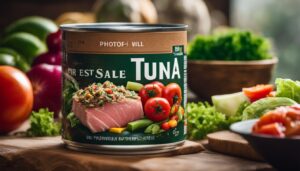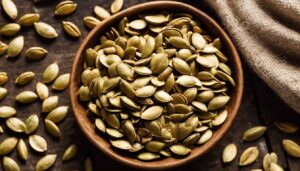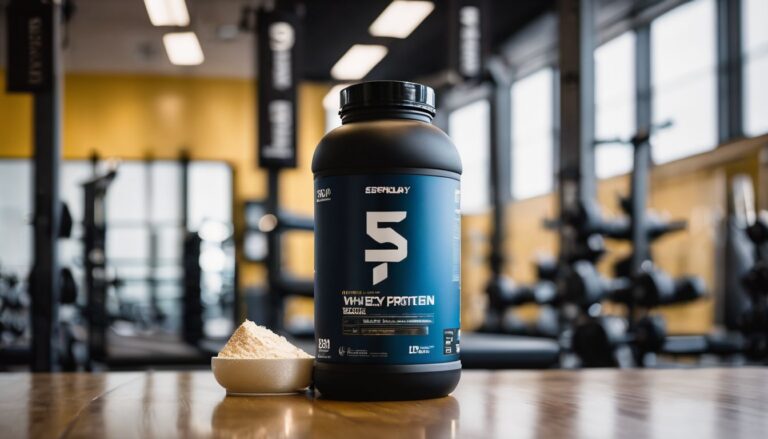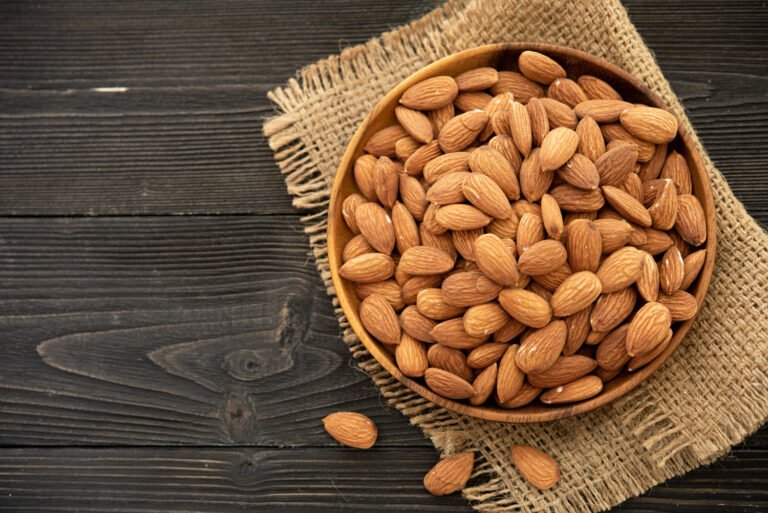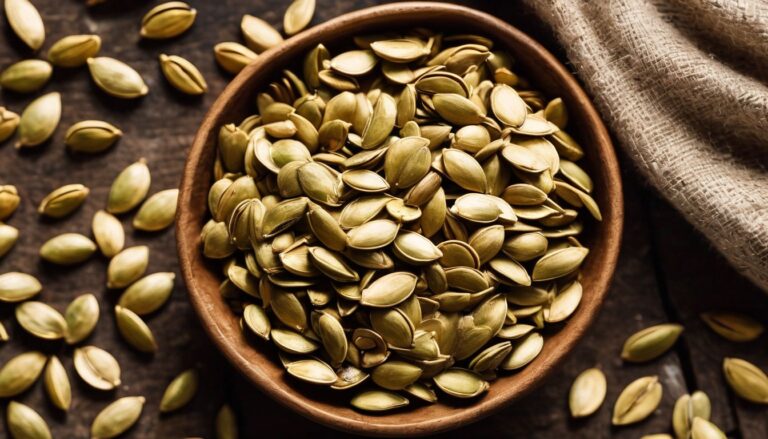Is Tuna A Good Source Of Protein? Exploring The Nutritional Benefits Of Tuna
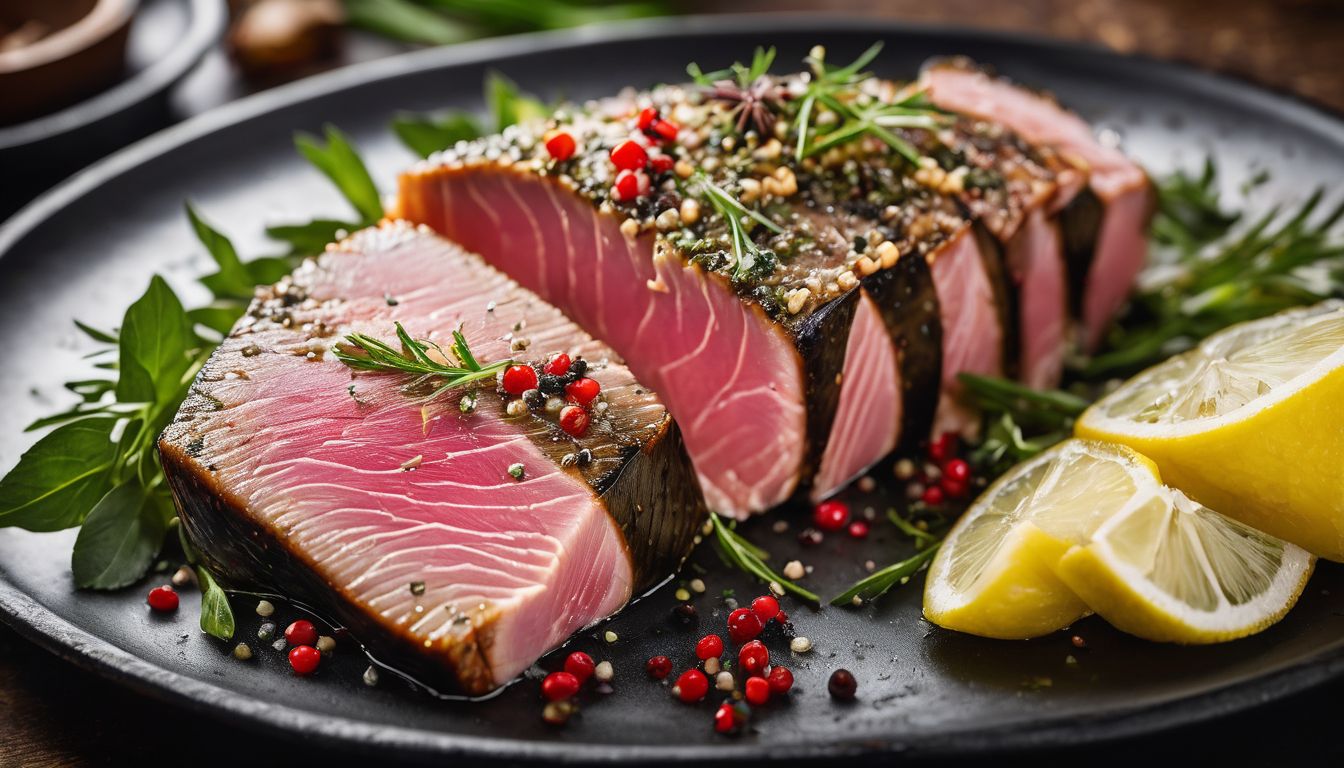
Are you trying to figure out if tuna is an excellent source of protein? The truth might surprise you—tuna is packed with high-quality protein along with a slew of essential vitamins and minerals! This article will dive deep into the nutritional benefits of this popular fish, exploring why it’s an all-star choice for anyone eager to maintain or build their muscle mass.
Ready to reel in some health insights? Dive right in!
Key Takeaways
- Tuna is a great source of high – quality protein, which is essential for muscle growth and repair.
- It contains important nutrients like omega – 3 fatty acids, vitamins, and minerals that support heart health and boost the immune system.
- Tuna can help with weight management due to its low calorie count and ability to keep you feeling full for longer periods of time.
- However, certain varieties of tuna may have high levels of mercury, posing potential risks for pregnant women and children.
Nutritional Profile of Tuna

Tuna is a high-quality protein source and contains essential vitamins and minerals, making it a beneficial addition to a balanced diet.
High-quality protein source

Tuna shines as a source of high-quality protein. This lean meat packs in significant amounts of proteins, essential for muscle growth, repair and overall bodily functions. A unique feature of tuna’s protein is its ‘completeness’ – it provides all the critical amino acids your body requires.
Consuming foods like tuna that are rich in complete proteins ensures adequate supply of these building blocks needed by our bodies. Additionally, despite being high in protein, tuna is low calorie, making it an excellent choice for those aiming to manage weight without compromising on nutrient intake.
Though there are various types of tuna available like bigeye or albacore, each offers a hefty dose of proteins beneficial to health.
Contains essential vitamins and minerals
Tuna holds a treasure trove of vitamins and minerals that are essential to our health. The high selenium content in tuna helps protect your body from damage caused by harmful free radicals and plays an integral role in thyroid function.
This protein-rich fish is also packed with vitamin B12, vital for maintaining brain health and crucial for the formation of red blood cells.
Furthermore, omega-3 fatty acids found abundantly in tuna manage inflammation and maintain heart health. People seeking a low-calorie source of these essential nutrients will find tuna an excellent option, adding significant value beyond just being another protein source for bodybuilding or post-workout meals.
The nutritional benefits offered by this seafood make it more than just a regular item on the dinner table; it’s practically a wellness powerhouse wrapped up in one tasty package.
Low in fat

Tuna is a lean protein source and this means it has very low fat content. Being high in protein while still being low in calories makes it desirable for health-conscious individuals aiming to maintain or lose weight.
Its essential nutrients, such as omega-3 fatty acids, are the good kind of fats that help reduce inflammation and promote heart health. By providing richness in taste without loading your meal with unnecessary fats, tuna fits perfectly into various diets including those focused on weight management.
The different types of tuna like bigeye offer ample protein but remain low in both fat and calories making them an ideal choice for many diet plans.
Contains beneficial fatty acids

Tuna is not only a great source of protein, but it also contains beneficial fatty acids. These fatty acids, known as omega-3s, are essential for our overall health and well-being. Omega-3s have been shown to reduce inflammation in the body, support heart health, and even improve brain function.
In fact, tuna is one of the best dietary sources of omega-3 fatty acids. By incorporating tuna into your diet, you can reap the benefits of these important nutrients and support your body’s optimal functioning.
Health Benefits of Tuna

Tuna supports muscle growth, aids weight management, promotes heart health, and contains immune-boosting nutrients. To discover more about the nutritional benefits of tuna, keep reading!
Supports muscle growth and repair

Tuna is an excellent source of protein, which is essential for supporting muscle growth and repair. Protein plays a crucial role in building and maintaining lean muscle mass. When we exercise or engage in physical activity, our muscles undergo stress and micro-tears occur.
Consuming enough protein, like that found in tuna, helps to repair these tears and promote the growth of new muscle tissue. Additionally, the amino acids present in tuna are vital for optimizing recovery after workouts.
By including tuna in your diet, you can ensure that your body has the necessary nutrients to support muscle development and improve overall athletic performance.
Helps with weight management
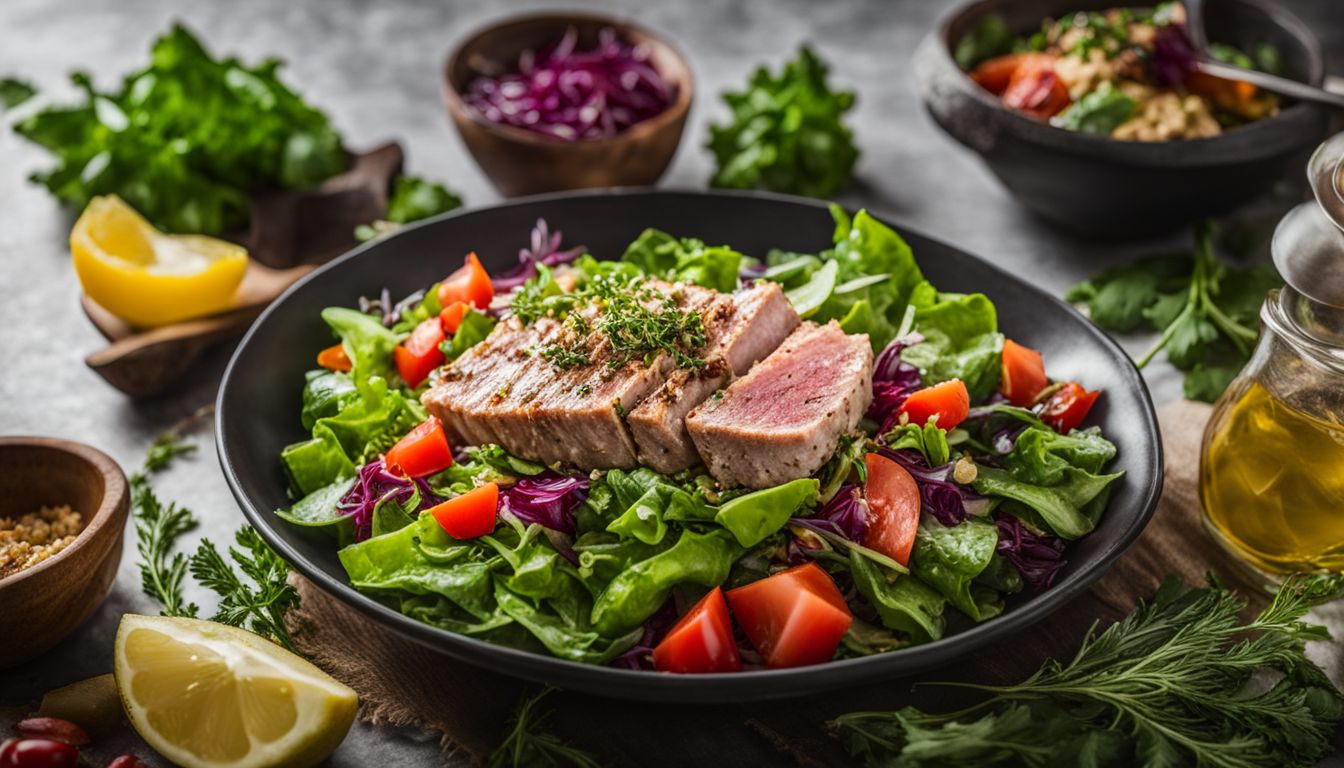
Tuna can be a helpful addition to your diet if you are looking to manage your weight. With its high protein content and low calorie count, tuna can keep you feeling full for longer periods of time, reducing the likelihood of overeating or snacking on unhealthy foods.
Additionally, tuna is low in fat, making it an excellent choice for those trying to maintain or lose weight. By incorporating tuna into your meals, you can satisfy your hunger while still maintaining a balanced and nutritious diet.
Good for heart health

Tuna is beneficial for heart health due to its high content of omega-3 fatty acids. These fatty acids have been shown to reduce the risk of heart disease by lowering levels of triglycerides, reducing inflammation in the arteries, and improving overall heart function.
In addition, tuna contains potassium, which helps regulate blood pressure and maintain a healthy cardiovascular system. Including tuna in your diet can contribute to a healthier heart and lower the risk of cardiovascular problems.
Contains immune-boosting nutrients

Tuna is not only a good source of protein but also contains immune-boosting nutrients. It is rich in vitamins and minerals that support the immune system, such as vitamin B12 and selenium.
Vitamin B12 plays a crucial role in maintaining overall health and supporting the production of red blood cells, while selenium helps with thyroid function and acts as an antioxidant to protect against cell damage.
Including tuna in your diet can help strengthen your immune system and keep you healthy.
Downsides of Tuna

Tuna can have a high mercury content in some varieties, posing potential risks for pregnant women and children.
Mercury content in some varieties
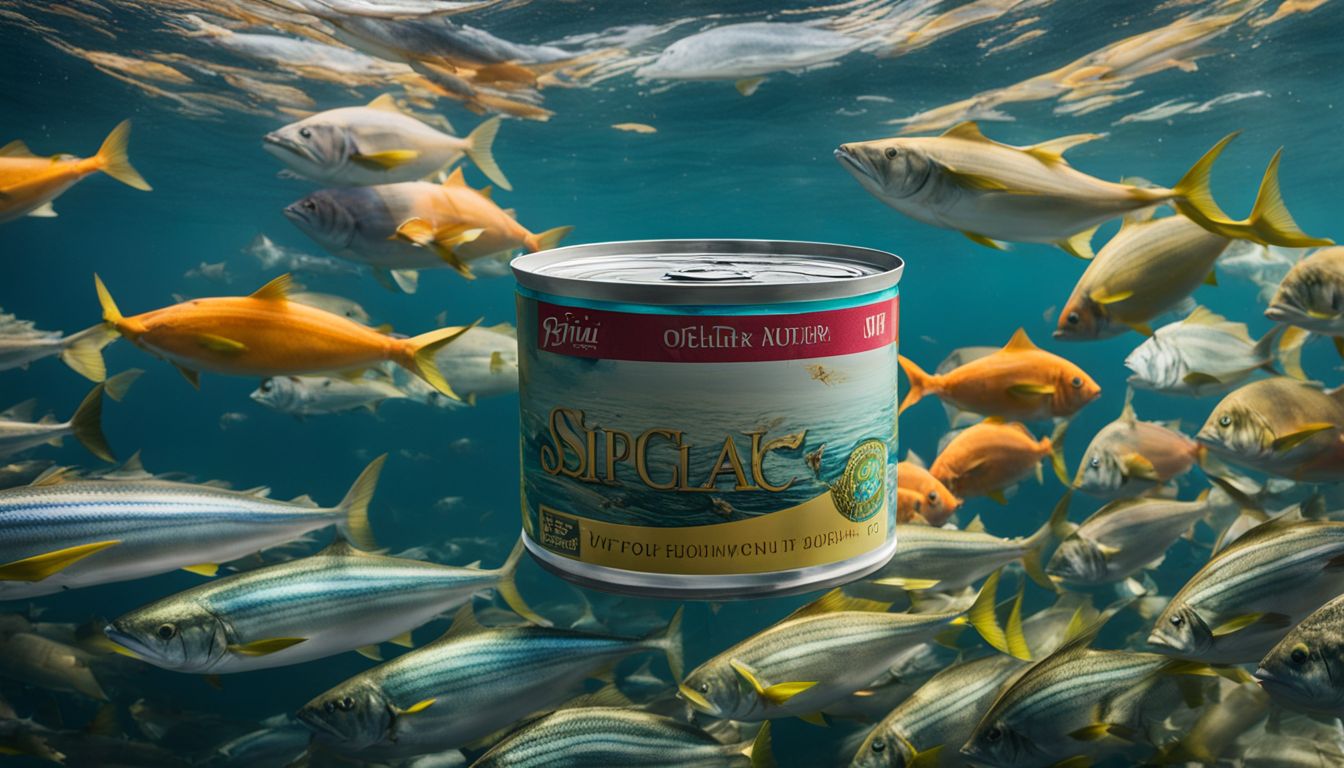
Some varieties of tuna may contain high levels of mercury. Mercury is a naturally occurring heavy metal that can be found in the environment and can make its way into the bodies of fish, including tuna.
Mercury can have harmful effects on the nervous system, especially in high amounts. It is important to choose types of tuna that are known to have lower mercury content, such as skipjack or light canned tuna, rather than larger species like albacore or yellowfin which tend to have higher levels.
Pregnant women and young children are particularly advised to limit their consumption of certain types of tuna due to the potential risks associated with mercury exposure.
Potential risks for pregnant women and children

Consuming tuna during pregnancy and for young children can pose potential risks due to its mercury content. Mercury can have harmful effects on the developing nervous systems of fetuses and young children.
It is recommended that pregnant women and those who are breastfeeding limit their intake of tuna, especially certain types like albacore and bigeye tuna, which tend to have higher levels of mercury compared to other varieties.
Children should also be cautious about consuming too much tuna, as their smaller bodies may be more susceptible to the adverse effects of mercury. Pregnant women and parents should consult with their healthcare provider for specific recommendations on safe seafood consumption during pregnancy or for children.
Environmental concerns

Tuna fishing has raised environmental concerns due to its impact on marine ecosystems. Overfishing of tuna species, such as bluefin and yellowfin tuna, has led to a decline in their populations.
This not only disrupts the balance of marine life but also affects other species that depend on them for food. Additionally, some fishing practices, like the use of large nets and longlines, can result in bycatch – unintentionally catching other marine animals such as dolphins, turtles, and sharks.
These issues highlight the need for sustainable fishing practices and responsible consumption to protect our oceans and preserve tuna populations for future generations.
Tuna and Sports Training

Tuna provides the necessary protein for muscle recovery, helps maintain a healthy weight, and contains important nutrients for energy and stamina. Discover how incorporating tuna into your diet can enhance your athletic performance and support your fitness goals.
Read more to learn about the nutritional benefits of tuna.
Provides necessary protein for muscle recovery

Tuna is a valuable protein source that can aid in muscle recovery. Protein is essential for repairing and building muscles after intense exercise or physical activity. Luckily, tuna contains high-quality protein that provides the necessary amino acids needed for this process.
Consuming tuna as part of your post-workout meal or snack can help support muscle growth and repair, allowing you to bounce back quicker and be ready for your next training session.
Helps maintain a healthy weight
Tuna can play a role in helping individuals maintain a healthy weight. Due to its high protein content and low calorie count, tuna can keep you feeling satisfied for longer periods, reducing the likelihood of overeating or snacking on unhealthy foods throughout the day.
Additionally, tuna is a lean meat that is low in fat, making it a suitable option for those looking to manage their weight or lose excess pounds. Incorporating tuna into your meals can provide you with a filling and nutritious source of protein while supporting your weight management goals.
Contains important nutrients for energy and stamina
Tuna is not only a great source of protein, but it also contains important nutrients that can boost energy and stamina. The high-quality protein found in tuna provides the building blocks needed for muscle repair and growth, which is crucial for athletes and those who engage in regular exercise.
Additionally, tuna is rich in vitamins and minerals that support overall energy production in the body. These include B vitamins like vitamin B12, which helps convert food into usable energy, as well as selenium, an essential nutrient involved in thyroid function.
So if you’re looking to fuel your workouts or enhance your endurance, incorporating tuna into your diet can be a beneficial choice.
Can be incorporated into a balanced diet for athletes
Athletes can benefit from incorporating tuna into their balanced diets. Here are some reasons why:
- Provides necessary protein for muscle recovery.
- Helps maintain a healthy weight by providing essential nutrients without excessive calories.
- Contains important nutrients like omega – 3 fatty acids, vitamins, and minerals for energy and stamina during workouts.
- Can be a versatile ingredient in various meal options for athletes, such as salads, sandwiches, or stir-fries.
- Offers a convenient source of protein that can be easily incorporated into pre- and post-workout meals.
Conclusion

In conclusion, tuna is a fantastic source of protein that offers numerous nutritional benefits. Its high-quality protein content, low fat levels, and essential vitamins and minerals make it an excellent choice for those looking to build muscle, manage weight, or support heart health.
Despite potential downsides such as mercury content in certain varieties, tuna can still be incorporated into a balanced diet to reap its many advantages. So go ahead and enjoy this delicious fish knowing that you’re nourishing your body with a powerful protein source.
FAQs
1. Is tuna a good source of protein?
Yes, tuna is a high source of protein, making it an excellent choice for those looking for lean protein options.
2. Can eating tuna help with bodybuilding and post-workout recovery?
Indeed, the high-quality proteins in tuna make it not just good but a great source of protein for bodybuilding and as a quick food option after workouts.
3. What is the nutrient content in different types of tuna like raw, steak or Ahi?
All types-showcasing raw to steak, including Ahi-are loaded with proteins alongside other essential nutrients reaffirming why people consider Tuna as the best source of Protein.
4. Are there any benefits besides the high-protein content when considering Tuna as my primary protein-source?
Apart from being an outstanding protein provider-Tuna’s nutritional profile also offers several other health benefits adding its role beyond merely being considered as one among many ‘good’ sources of Protein.
5. Can I rely on canned or packaged variations if fresh Tuna isn’t readily accessible to me frequently?
Certainly! Whether canned or fresh -all forms hold their standing as quality sources promising you won’t have to seek alternate quick protein sources.
Sources referenced in this article
- https://www.webmd.com/diet/health-benefits-tuna
- https://www.relish.com/food-wiki/153894/tuna-important-facts-health-benefits-and-recipes
- https://www.lifehack.org/315317/20-amazing-health-benefits-tuna-fish
- https://www.mindbodygreen.com/articles/is-tuna-good-for-you
- https://www.nutritionadvance.com/types-of-tuna-nutrition/
- https://www.verywellfit.com/tuna-nutrition-facts-calories-and-health-benefits-4114019
- https://wildplanetfoods.com/pages/nutrition-facts

Author
Years ago, the spark of my life’s passion ignited in my mind the moment I stepped into the local gym for the first time. The inaugural bead of perspiration, the initial endeavor, the very first surge of endorphins, and a sense of pride that washed over me post-workout marked the beginning of my deep-seated interest in strength sports, fitness, and sports nutrition. This very curiosity blossomed rapidly into a profound fascination, propelling me to earn a Master’s degree in Physical Education from the Academy of Physical Education in Krakow, followed by a Sports Manager diploma from the Jagiellonian University. My journey of growth led me to gain more specialized qualifications, such as being a certified personal trainer with a focus on sports dietetics, a lifeguard, and an instructor for wellness and corrective gymnastics. Theoretical knowledge paired seamlessly with practical experience, reinforcing my belief that the transformation of individuals under my guidance was also a reflection of my personal growth. This belief holds true even today. Each day, I strive to push the boundaries and explore new realms. These realms gently elevate me to greater heights. The unique combination of passion for my field and the continuous quest for growth fuels my drive to break new ground.

